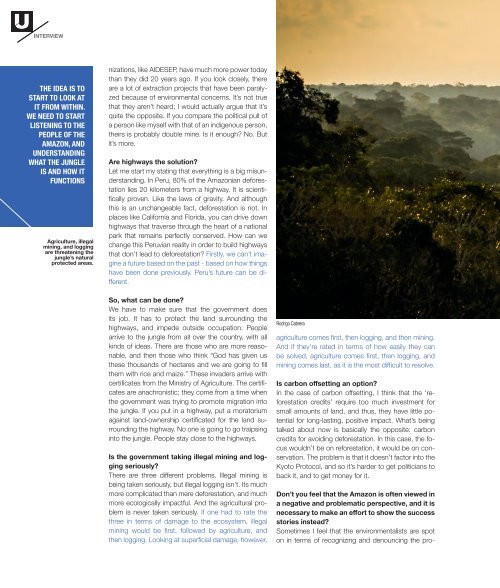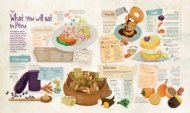UJ #7 - Peruvian Amazon
You also want an ePaper? Increase the reach of your titles
YUMPU automatically turns print PDFs into web optimized ePapers that Google loves.
INTERVIEW<br />
THE IDEA IS TO<br />
START TO LOOK AT<br />
IT FROM WITHIN.<br />
WE NEED TO START<br />
LISTENING TO THE<br />
PEOPLE OF THE<br />
AMAZON, AND<br />
UNDERSTANDING<br />
WHAT THE JUNGLE<br />
IS AND HOW IT<br />
FUNCTIONS<br />
Agriculture, illegal<br />
mining, and logging<br />
are threatening the<br />
jungle’s natural<br />
protected areas.<br />
nizations, like AIDESEP, have much more power today<br />
than they did 20 years ago. If you look closely, there<br />
are a lot of extraction projects that have been paralyzed<br />
because of environmental concerns. It’s not true<br />
that they aren’t heard; I would actually argue that it’s<br />
quite the opposite. If you compare the political pull of<br />
a person like myself with that of an indigenous person,<br />
theirs is probably double mine. Is it enough? No. But<br />
it’s more.<br />
Are highways the solution?<br />
Let me start my stating that everything is a big misunderstanding.<br />
In Peru, 80% of the <strong>Amazon</strong>ian deforestation<br />
lies 20 kilometers from a highway. It is scientifically<br />
proven. Like the laws of gravity. And although<br />
this is an unchangeable fact, deforestation is not. In<br />
places like California and Florida, you can drive down<br />
highways that traverse through the heart of a national<br />
park that remains perfectly conserved. How can we<br />
change this <strong>Peruvian</strong> reality in order to build highways<br />
that don’t lead to deforestation? Firstly, we can’t imagine<br />
a future based on the past - based on how things<br />
have been done previously. Peru’s future can be different.<br />
So, what can be done?<br />
We have to make sure that the government does<br />
its job. It has to protect the land surrounding the<br />
highways, and impede outside occupation. People<br />
arrive to the jungle from all over the country, with all<br />
kinds of ideas. There are those who are more reasonable,<br />
and then those who think “God has given us<br />
these thousands of hectares and we are going to fill<br />
them with rice and maize.” These invaders arrive with<br />
certificates from the Ministry of Agriculture. The certificates<br />
are anachronistic; they come from a time when<br />
the government was trying to promote migration into<br />
the jungle. If you put in a highway, put a moratorium<br />
against land-ownership certificated for the land surrounding<br />
the highway. No one is going to go traipsing<br />
into the jungle. People stay close to the highways.<br />
Is the government taking illegal mining and logging<br />
seriously?<br />
There are three different problems. Illegal mining is<br />
being taken seriously, but illegal logging isn’t. Its much<br />
more complicated than mere deforestation, and much<br />
more ecologically impactful. And the agricultural problem<br />
is never taken seriously. If one had to rate the<br />
three in terms of damage to the ecosystem, illegal<br />
mining would be first, followed by agriculture, and<br />
then logging. Looking at superficial damage, however,<br />
Rodrigo Cabrera<br />
agriculture comes first, then logging, and then mining.<br />
And if they’re rated in terms of how easily they can<br />
be solved, agriculture comes first, then logging, and<br />
mining comes last, as it is the most difficult to resolve.<br />
Is carbon offsetting an option?<br />
In the case of carbon offsetting, I think that the ‘reforestation<br />
credits’ require too much investment for<br />
small amounts of land, and thus, they have little potential<br />
for long-lasting, positive impact. What’s being<br />
talked about now is basically the opposite: carbon<br />
credits for avoiding deforestation. In this case, the focus<br />
wouldn’t be on reforestation, it would be on conservation.<br />
The problem is that it doesn’t factor into the<br />
Kyoto Protocol, and so it’s harder to get politicians to<br />
back it, and to get money for it.<br />
Don’t you feel that the <strong>Amazon</strong> is often viewed in<br />
a negative and problematic perspective, and it is<br />
necessary to make an effort to show the success<br />
stories instead?<br />
Sometimes I feel that the environmentalists are spot<br />
on in terms of recognizing and denouncing the pro-

















